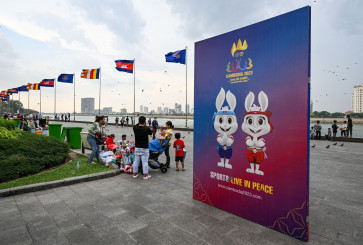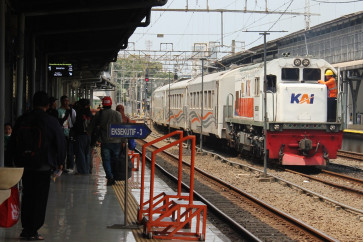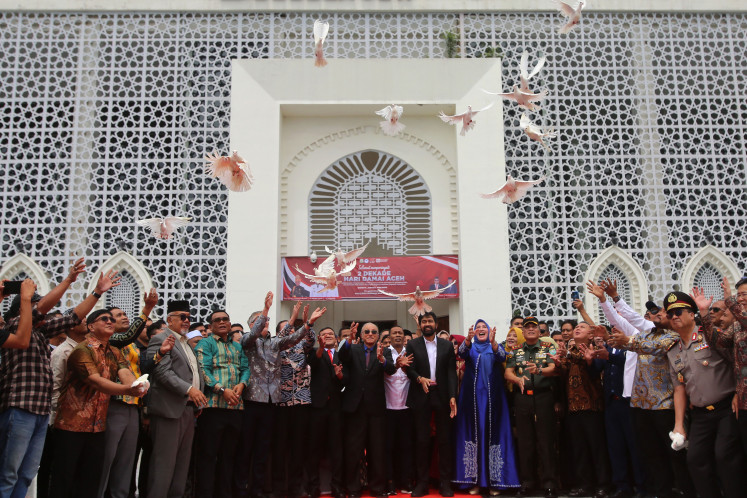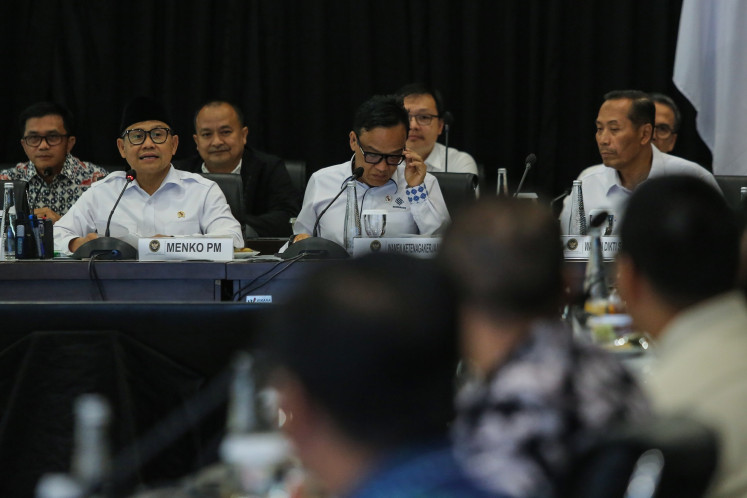Popular Reads
Top Results
Can't find what you're looking for?
View all search resultsPopular Reads
Top Results
Can't find what you're looking for?
View all search resultsPublishing in higher education: Toward language and knowledge democratization
A sense of complacency among education authorities can be felt today especially when they have imposed a stiff measure, requiring academics nationwide to get their scholarly works published in the so-called reputable journals indexed by international databases such as Scopus and the Science Citation Index
Change text size
Gift Premium Articles
to Anyone
A
sense of complacency among education authorities can be felt today especially when they have imposed a stiff measure, requiring academics nationwide to get their scholarly works published in the so-called reputable journals indexed by international databases such as Scopus and the Science Citation Index. This regulation applies not only to university professors, but also to graduate students (both master’s and doctoral students).
The creation of this policy has revolutionized the traditional view of university as relying solely on its orientation to teaching and research. To encourage their academic staff to publish, universities are no longer hesitant to disburse a large amount of money as an investment for quality human resources. Rewards and incentives also follow if the scholarly works get published in internationally indexed journals.
Conversely, serious consequences await academic staff who produce no journal articles. At best, they suffer academic sanctions such as a delay in academic promotion, the rejection of a research grant proposal or even expulsion from the university, at worst.
It is therefore no exaggeration to lay a claim that the educational pendulum has swung far away from the teaching-researching orientation to academic publication.
Concomitant with the global fetish of constructing and producing knowledge through the medium of academic journal publication, the policy obligating universities nationwide to publish in international fora is certainly welcomed.
After all, research products need to be disseminated, so as their benefits can be felt by both local and global societies. Further, robust intellectual exchanges among scholars ought to be continuously cultivated to ensure innovation and creation in academia. In this respect, academic journals prove to be a useful medium for channeling research findings to societies, projecting innovative and creative minds, as well as for reaching a wide readership.
Nevertheless, despite these merits, the national publish or perish policy, which puts high pressures on local academics, brings about devastating psychological and cultural effects. Living in a dominant oral culture where writing in a high stake genre like in scholarly journals is not a norm, they must exhibit extra struggles to adjust themselves to the imposition of literate culture.
The lingering problems are that academic journals serve and prioritize the interests of the international academic elites who have both linguistic and nonlinguistic resources. This will eventually create what academic RK Merton calls “the Matthew Effect in science and scholarship”, in which the already renowned scholars are put at an advantage over the less recognized scholars.
This is understandable because the more renowned academic elites that contribute to a journal, the more chance the journal has of boosting its citation indexes.
This privilege clearly disadvantages local scholars and students, most of whom are neophytes, and are still grappling with difficulties in writing for a global readership. The perceived problems these neophytes often encounter include unfamiliarity with the expected modes of rhetorical patterns of journal articles, the absence of authorial voice in writing, and the difficulty in making claims forcefully and convincingly.
It may come as no surprise if most local academics resist the policy by resorting to a common academic ethics violation like plagiarism — the practice of borrowing ideas and other writing conventions without explicit acknowledgment of other writers whose ideas are referenced.
While it is true that the lack of firsthand experience in writing for publication can be tackled through intensive training, workshops, courses or manuals, there is another aspect of global academic writing that has raised concern among scholars: language stratification and hegemony of knowledge.
As English has become the privileged language of international publication, there is a strong tendency that this language is the most dominant one that can suppress other languages. There is now a widespread belief that publication in English is more favored and more valued than any publication in other languages.
This is where language stratification and knowledge hegemony find their roots. Sadly, the national publish or perish policy, which is now taking effect in higher education institutions nationwide, ardently promotes this stratification and hegemony to local scholars.
Consider, for example, the national regulation that obligatorily requires both university professors and postgraduate students (especially doctorate candidates) to publish in internationally indexed journals. When used for the promotion of academic ranks, local journals written in Indonesian will not be valued as highly as English-written journals published in Western countries. Even worse, locally produced journals will be denied acceptance if used as a sole requirement for obtaining professorship.
Knowledge hegemony is maintained through the tight selection of articles submitted in the journals. Established knowledge prevalent in the academic discourse community will be valorized over other types of knowledge stemming from outside this community, with the latter being relegated to an inferior status. In fact, acceptance or rejection of a submitted manuscript is often determined by whether or not a writer conforms to what is prescribed by this elite academic community.
Both language stratification and knowledge hegemony are thus perpetuated through the mechanism of the publish or perish policy, which is measured through the locally designed data storage of local scholars’ academic outcomes known as the Science and Technology Index (SINTA).
The eventual danger for sustaining language stratification in the policy is the creation of a monolingual transnational community, with English being the sole privileged language for wider written communication.
With the prevalence of inequality in language use and knowledge construction and production in global academic publishing industries, the national publish and perish policy must be inclusive in its orientation and goals. Linguistic diversity and knowledge democratization in academic publishing should be the key consideration if the spirit of multilingualism is to be sustained globally.
This idea can be realized by designing pedagogies that can help both multilingual scholars and postgraduate students in participating more equally in knowledge construction and production.
For a psychological and cultural reason, supporting young scholars to publish in local journals written in Indonesian can be a viable initial step to help familiarize them with the convention of academic writing, prior to exhorting them to publish in the mainstream English written journals.
Indeed, it is the unfamiliarity with this convention that often prevents them from participating in global knowledge construction and production.
Furthermore, writing pedagogies should aim at providing young scholars with research skills that can enable them to make use of locally developed knowledge which can counter what has been considered as established knowledge.
In so doing, students and multilingual scholars are made aware of the fact that global academic publishing practice is not deterministic in its nature, but rather a socially constructed activity which provides spaces for writers to arrogate to themselves language and knowledge for their own communicative purposes.
_________________
The writer is a professor of linguistics at the Graduate School of Applied English Linguistics, Atma Jaya Catholic University, Jakarta. He can be reached at setiono.sugiharto@gmail.com.










